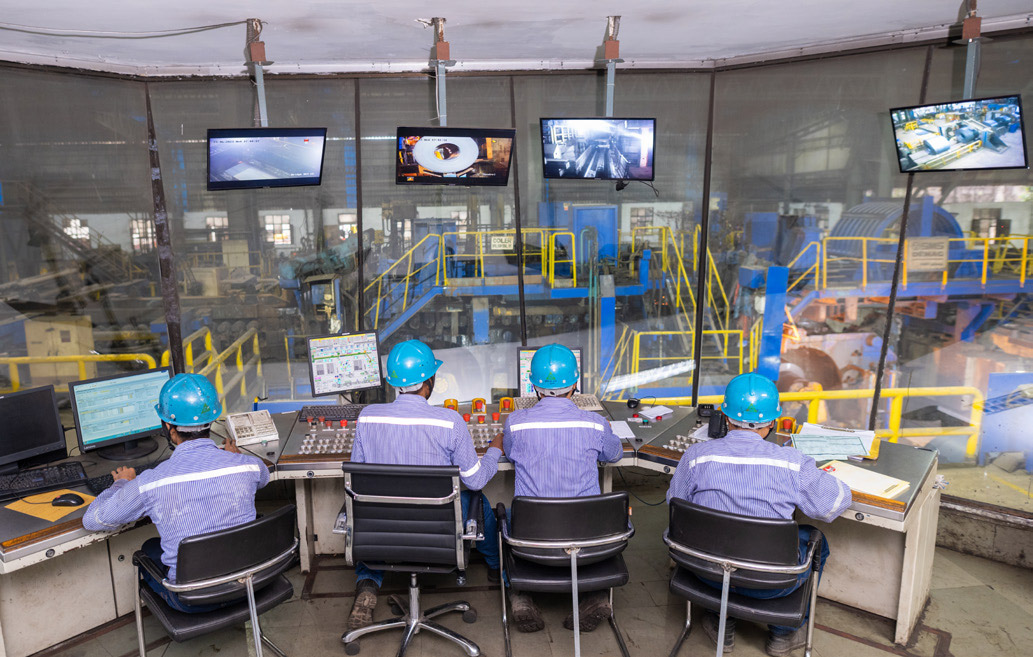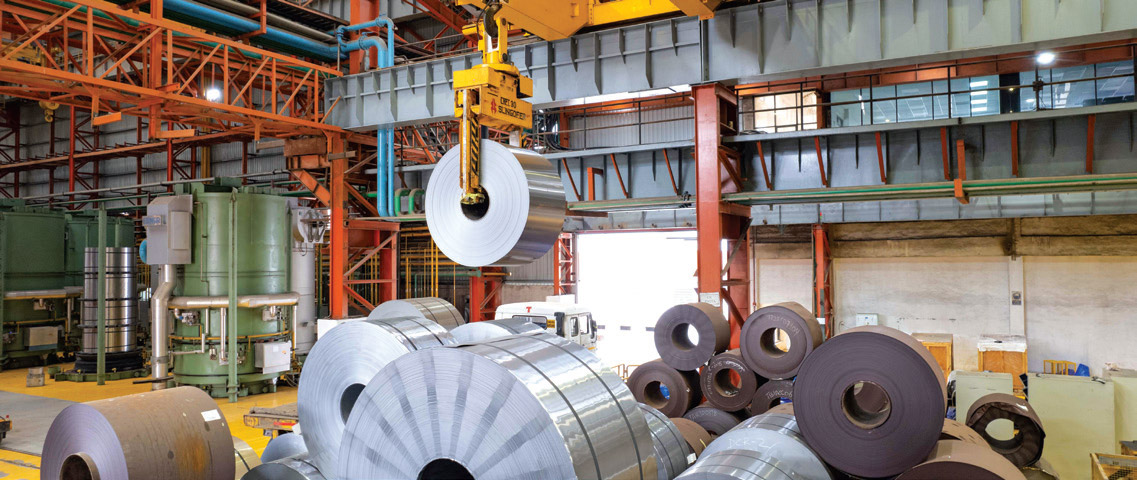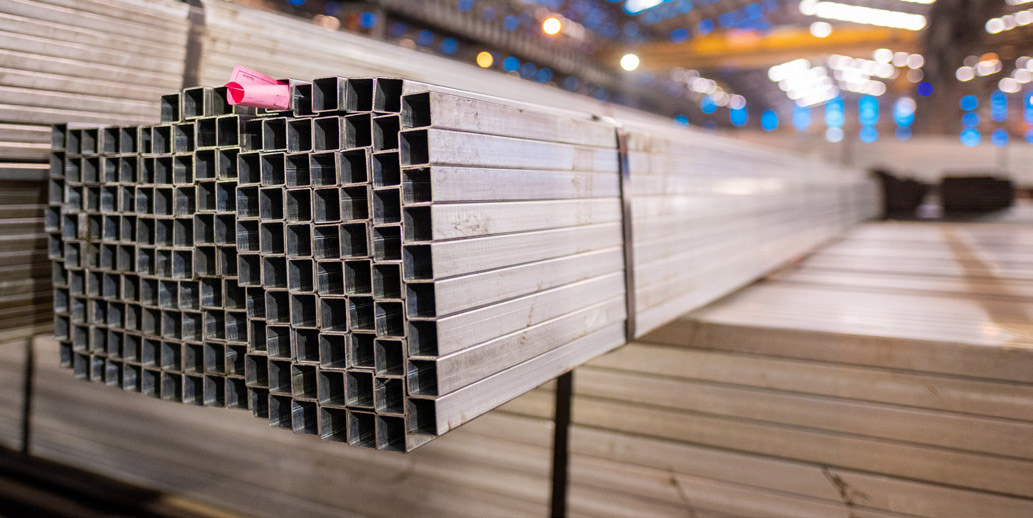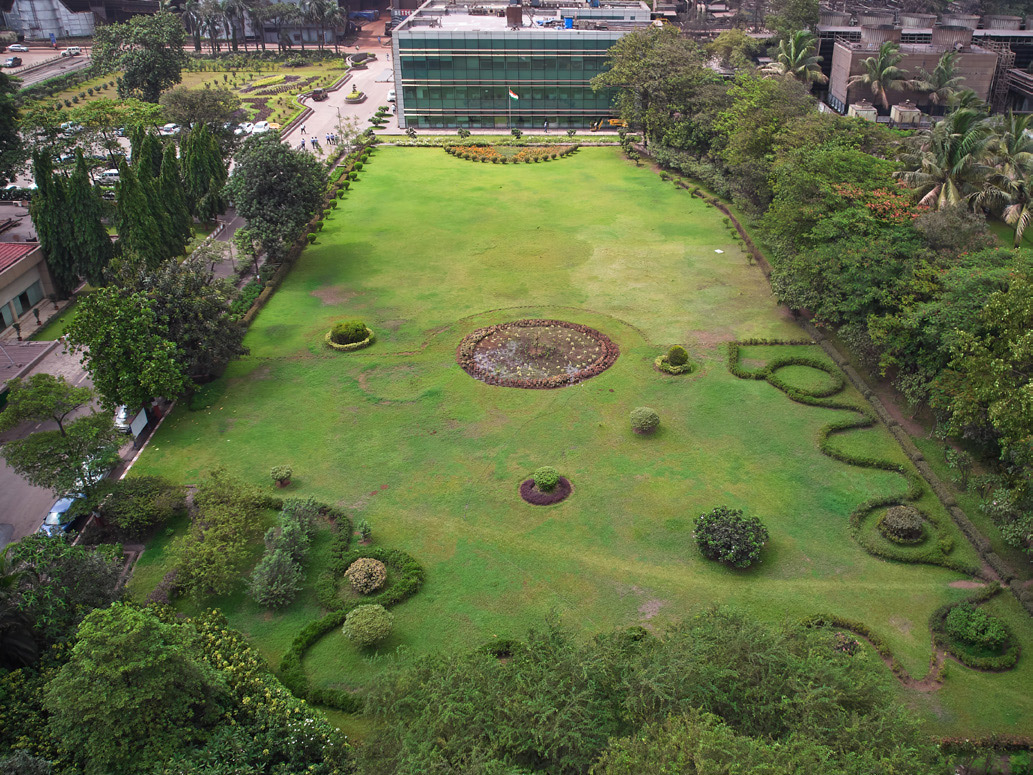OPERATING CONTEXT
Best positioned to tap opportunities
JSW Steel continues to capitalise on the transformative journey of the Indian economy as it charts an ambitious path with deliberate and strategic investments in manufacturing and infrastructure. Steel, with its unparalleled versatility, is a critical enabler of economic resilience and sustainability. As a company, we aim to leverage macroeconomic drivers, respond proactively to market demands and contribute to the sustainable transformation of India's industrial base.
Macroeconomic trends to observe
Increasing global steel production
Global crude steel production is experiencing growth, especially outside of China, reflecting a rising demand for steel.
Surge in global steel demand
The global demand for finished steel is expected to grow by 1.7% in 2024, driven by infrastructure development and industrial activities.
Competitive pressure from Chinese steel exports
Increased steel exports from China continue to pose a competitive challenge for global steel markets.
Volatility in raw material prices
The fluctuating prices of raw materials, with coking coal prices moderating and iron ore prices remaining firm, have affected cost management strategies.
Technological advancements and digitalisation
The integration of advanced technologies and digital solutions in mining and logistics is becoming more prominent.
Focus on decarbonisation and green steel
Countries are addressing climate risk challenges by imposing restrictions on carbon emissions. Steel companies are outlining plans to transition to green steel production



136.25 MT
India’s apparent steel consumption
Growth potential in domestic steel demand
![]() India is the second-largest producer and consumer of crude steel globally and
currently has an installed capacity of ~175 MTPA. The National Steel Policy (2017)
aims to increase this capacity to ~300 MTPA by FY 2030-31. Moreover, India's per
capita finished steel consumption remains below the global average, suggesting
significant growth potential in demand.
India is the second-largest producer and consumer of crude steel globally and
currently has an installed capacity of ~175 MTPA. The National Steel Policy (2017)
aims to increase this capacity to ~300 MTPA by FY 2030-31. Moreover, India's per
capita finished steel consumption remains below the global average, suggesting
significant growth potential in demand.
![]() JSW Steel is set to increase its domestic capacity to 50 MTPA by FY 2030-31.
Our diverse product portfolio caters to various user industries, ensuring broad market
reach. Additionally, robust iron ore linkage through captive mines is expected to
support margin-accretive volume growth.
JSW Steel is set to increase its domestic capacity to 50 MTPA by FY 2030-31.
Our diverse product portfolio caters to various user industries, ensuring broad market
reach. Additionally, robust iron ore linkage through captive mines is expected to
support margin-accretive volume growth.
Government infrastructure initiatives
![]() Key projects, including the development of new highways, railways, ports,
and urban infrastructure under initiatives like the National Infrastructure Pipeline
(NIP) and Gati Shakti Plan, are expected to consume vast quantities of steel.
Additionally, the Smart Cities Mission and Affordable Housing initiatives will further
strengthen demand.
Key projects, including the development of new highways, railways, ports,
and urban infrastructure under initiatives like the National Infrastructure Pipeline
(NIP) and Gati Shakti Plan, are expected to consume vast quantities of steel.
Additionally, the Smart Cities Mission and Affordable Housing initiatives will further
strengthen demand.
![]() JSW Steel has become a preferred supplier, providing high-strength TMT Bars,
HR Plates, and LRPC, significantly contributing to the construction of these vital
development projects across the country.
JSW Steel has become a preferred supplier, providing high-strength TMT Bars,
HR Plates, and LRPC, significantly contributing to the construction of these vital
development projects across the country.

11.1% 
Capital expenditure outlay over previous year

40%+
Of India’s automotive market to be constituted by EVs by 2030
Demand for safer and more efficient mobility
![]() India's automotive industry is driven by stricter safety regulations, fuel efficiency,
and the transition to electric vehicles (EVs). The demand for advanced high-strength
steel (AHSS) is steadily rising, given its high tensile strength and cost effectiveness.
India's automotive industry is driven by stricter safety regulations, fuel efficiency,
and the transition to electric vehicles (EVs). The demand for advanced high-strength
steel (AHSS) is steadily rising, given its high tensile strength and cost effectiveness.
![]() JSW Steel is collaborating closely with auto OEMs to enhance vehicle safety,
reduce weight, and improve fuel efficiency. Our AHSS is used in key crash and safety
components such as A&B pillars, crossbeams, and door impact beams. Additionally,
we have developed specialised steel for suspension parts, ensuring optimal fatigue
life and high strength.
JSW Steel is collaborating closely with auto OEMs to enhance vehicle safety,
reduce weight, and improve fuel efficiency. Our AHSS is used in key crash and safety
components such as A&B pillars, crossbeams, and door impact beams. Additionally,
we have developed specialised steel for suspension parts, ensuring optimal fatigue
life and high strength.


~12%
Of India’s total carbon emissions are attributed to steelmaking
Implications of the Carbon Border Adjustment Mechanism (CBAM)
![]() The European Commission's CBAM imposes a tax on carbon-intensive imports, affecting global
trade dynamics. The Indian steel industry is preparing for a shift as it exports to the EU.
The European Commission's CBAM imposes a tax on carbon-intensive imports, affecting global
trade dynamics. The Indian steel industry is preparing for a shift as it exports to the EU.
![]() JSW Steel has accelerated decarbonisation initiatives, invested in low-carbon steel
production and enhanced energy efficiency to meet global regulatory standards and minimise
potential CBAM tariffs.
JSW Steel has accelerated decarbonisation initiatives, invested in low-carbon steel
production and enhanced energy efficiency to meet global regulatory standards and minimise
potential CBAM tariffs.
Lease expiries and auction dynamics
![]() The upcoming expiry of numerous iron ore leases by 2030 is set to reshape the steel
industry. To secure new leases, companies must navigate government auctions, positioning
themselves advantageously through strategic investments and alliances.
The upcoming expiry of numerous iron ore leases by 2030 is set to reshape the steel
industry. To secure new leases, companies must navigate government auctions, positioning
themselves advantageously through strategic investments and alliances.
![]() JSW Steel is looking forward to secure raw material requirements by participating in the
government auctions of iron ore and acquire strategically important iron ore mines.
JSW Steel is looking forward to secure raw material requirements by participating in the
government auctions of iron ore and acquire strategically important iron ore mines.

Iron ore sourcing is pivotal for steel production

India is likely to be the world’s manufacturing hub for low-emission steel by 2030, according to NITI Aayog
Expansion of green steel production
![]() There is a growing shift towards sustainable steel production methods, including the use of
green hydrogen and carbon capture technologies.
There is a growing shift towards sustainable steel production methods, including the use of
green hydrogen and carbon capture technologies.
![]() JSW Steel is investing in green steel production by exploring the use of green hydrogen and
implementing carbon capture, utilisation, and storage (CCUS) technologies to reduce its
carbon footprint and meet sustainability goals. We also have a WBCSD membership, are a part
of Responsible Steel, and have been Worldsteel champions six times in a row.
JSW Steel is investing in green steel production by exploring the use of green hydrogen and
implementing carbon capture, utilisation, and storage (CCUS) technologies to reduce its
carbon footprint and meet sustainability goals. We also have a WBCSD membership, are a part
of Responsible Steel, and have been Worldsteel champions six times in a row.


20-30%
Expected improvement in demand forecast through predictive analytics across industries
Digital transformation
![]() The steel industry is increasingly adopting digital technologies to optimise
operations, enhance efficiency, and reduce costs. These include AI, IoT, Augmented
Reality/Virtual Reality and machine learning.
The steel industry is increasingly adopting digital technologies to optimise
operations, enhance efficiency, and reduce costs. These include AI, IoT, Augmented
Reality/Virtual Reality and machine learning.
![]() JSW Steel is implementing digital logistics management, IoT sensors, RFID
tags, and real-time monitoring systems to improve operational efficiency, reduce
turnaround times, and enhance safety standards. Building a future-ready workforce
and providing digital education are also part of our Digital Vision 2026.
JSW Steel is implementing digital logistics management, IoT sensors, RFID
tags, and real-time monitoring systems to improve operational efficiency, reduce
turnaround times, and enhance safety standards. Building a future-ready workforce
and providing digital education are also part of our Digital Vision 2026.
Increased recycling and circular economy practices
![]() There is an expanded use of scrap metal in production and a transition to electric
arc furnaces. Additionally, the development of closed-loop systems for material use
aims to maximise resource efficiency, while lifecycle assessments are employed to
improve the environmental footprint of products
There is an expanded use of scrap metal in production and a transition to electric
arc furnaces. Additionally, the development of closed-loop systems for material use
aims to maximise resource efficiency, while lifecycle assessments are employed to
improve the environmental footprint of products
![]() By expanding the use of scrap metal, JSW Steel reduces its reliance on
high-cost raw materials, enhancing resource efficiency and lowering production
costs. Developing closed-loop systems minimises waste and environmental
impact, ensuring materials are reused within the production cycle for more
sustainable manufacturing.
By expanding the use of scrap metal, JSW Steel reduces its reliance on
high-cost raw materials, enhancing resource efficiency and lowering production
costs. Developing closed-loop systems minimises waste and environmental
impact, ensuring materials are reused within the production cycle for more
sustainable manufacturing.

Net Zero by 2070
India's commitment
![]() Industry trends
Industry trends
![]() Opportunities and responses
Opportunities and responses